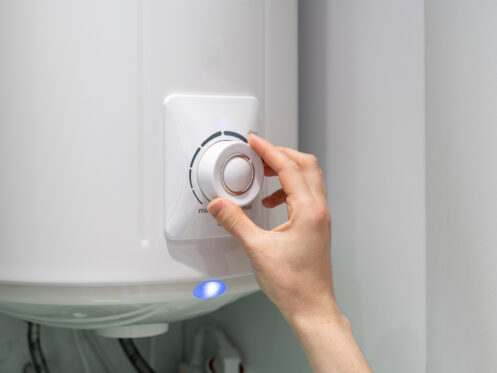During the winter months, boilers are extremely important since they provide heat and hot water for our houses. Be that as it may, nothing is more annoying and troublesome than dealing with a boiler that won’t heat water. To get their heating systems back to normal operation as soon as possible, homeowners must understand what is causing this problem. Let’s take a close look at the top 11 causes of a boiler not generating hot water and how to fix them.
1. Fuel/Power Supply Issues
A steady supply of fuel or electricity is the most basic need for a boiler to function. No matter what kind of boiler you have — electric, gas, or oil — if the fuel or power supply goes out, you won’t have hot water. To fix this issue, a professional will look for disruptions in the power supply. Harsh weather can cause fuel/power supply issues as well, such as severe thunderstorms or tornadoes that cause electrical outages. In these instances, the only way to fix the power supply problem is to wait for the power to come back on or to connect the boiler to a generator. However, it’s very important that you use the right kind of generator and connections.
2. Faulty Thermostat
A faulty thermostat will provide inaccurate temperature readings, making it impossible for the boiler to adequately heat water. As a result, you’ll experience water that is either too hot or too cold. Inaccurate temperature readings can also lead to uneven heating from the boiler, further compromising your indoor comfort. If the problem persists after checking the settings and changing the batteries in the thermostat, it’s best to have a professional calibrate the thermostat. In the event that our technician is unable to resolve the issue with the current one, a replacement may be necessary.
3. Ignition System Issues
If the boiler won’t produce hot water, the unit’s ignition system is one of the first things you want to check. The three most common ignition systems used in boilers are standing pilot lights, electronic ignitions, and hot surface ignitors. If you notice the pilot light keeps going out or if anything is wrong with the ignition system, it’s best to have it checked out by an expert. Working on the ignition system is not something to do by yourself since it can be dangerous. Performing DIY work on a boiler can also cause major damage that is costly to repair.
4. Faulty Diverter Valve
Hot water from a boiler diverts itself to the home’s plumbing or central heating system using a diverter valve. If this valve is malfunctioning, the boiler might not be able to send heated water to the taps. Repairing a broken diverter valve on a boiler usually involves a methodical procedure. To do this, professionals remove the valve from its assembly, inspect it, and then fix or replace the broken parts. The next step involves verifying the system’s ability to deliver hot water correctly.
5. Low Water Pressure
Inadequate heating occurs when the water pressure in a boiler is too low, which prevents the water from circulating efficiently. In order to fix this, experts must determine what’s causing it. Possible causes include leaks, blocked valves, or an uneven pressure-reducing valve. After that, they repair any leaks, make sure the valves are working properly, and repressurize the system to the required amount. One of the best ways to check for, regulate, and prevent low water pressure from recurring is to invest in regular boiler maintenance.
6. Airlocks in the System
Airlocks in a boiler system can also cause disruptions to water flow, making it impossible for the water to reach the home’s faucets and taps. To fix this, experts remove air from the system, usually beginning with the radiators. They accomplish this by releasing trapped air via the opening of bleed valves, which permits the unrestricted circulation of hot water. In addition to bleeding radiators, professionals can help prevent airlocks by periodically flushing the system to remove accumulated sludge and debris.
7. Limescale Buildup
Cumulative limescale building in boilers reduces heat exchange efficiency, which in turn reduces the amount of hot water that the system can produce. As a solution, experts descale the system, which usually involves the use of chemical descalers or mechanical methods to eliminate the deposits. The chemical treatments help dissolve the limescale, while the descaling pumps or power flushers remove the deposits. Proper maintenance, such as using water softeners or scale inhibitors, helps keep boilers running smoothly and reliably by preventing the formation of limescale.
8. Failed Circulator Pump
Another important component that affects the water circulation in a boiler is the circulator pump. When this part goes bad or breaks, the boiler will operate, but it won’t produce hot water. By having a professional inspect the boiler regularly, you can catch circulator pump problems before they cause a loss of hot water. Experts fix this problem by checking the state of the pump to determine whether it needs replacing or repairing. To install a new one, the technician will first detach the old one, then install the new one, followed by testing the system to make sure it works correctly.
9. Thermocouple Issues
There are a number of factors that can affect thermocouples in boiler systems. These parts deteriorate with time as a result of wear and tear, age, or extreme heat. Incorrect positioning of a thermocouple can also cause major problems; this means the professional installation of thermocouples is paramount to their functionality. No matter the cause, problems with the thermocouple cause insufficient gas supply to the burner by reducing the efficiency of voltage generation, thus leading to no hot water. You should never attempt to repair or replace a thermocouple yourself. This is a task that only professionals should handle.
10. Blocked Pipes
Sludge, debris, and silt buildup are all possible causes of blocked pipes in a boiler system. The only way to fix this problem is by hiring a professional. Experts use tools like descaling pumps, chemical cleansers, and power flushing systems to fix blocked pipes. A technician may also recommend that you use water treatment additives or inhibitors to prevent limescale and corrosion, both of which can lead to blocked pipes. You may also find it helpful to install a magnetic filter to keep magnetic debris from circulating through the system. A scale inhibitor is another effective preventative strategy you can use to reduce the formation of limescale in the pipes.
11. Faulty Pressure Relief Valve
Wear, corrosion, and problems with calibration can all cause pressure relief valves in boiler water heating systems to malfunction. Faulty pressure relief valves lead to the improper release of excess pressure, which in turn triggers a safety shutdown that stops the generation of hot water. Experts fix this by checking the pressure relief valve and, if needed, replacing it. This keeps the valve in good working order, which keeps the boiler from shutting down unnecessarily and keeps the water heated efficiently and safely. The best way to find and fix problems with pressure relief valves is to have a professional examine them regularly.
F.F. Hitchcock Plumbing, Heating & Cooling is here to handle all of your boiler maintenance and repair needs. We also specialize in helping Cheshire homeowners with all of their cooling needs, as well as gas piping, drain cleaning and so much more. Give us a call now to find out why your boiler isn’t producing hot water and how to fix it.

Frequently Asked Questions








